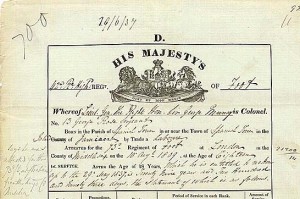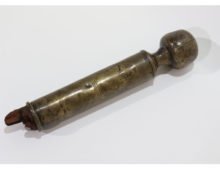George Rose: A black soldier at Waterloo
February 5, 2016 - Richard Moss in News
The story of George Rose: a black soldier in Wellington's Army who fought at Waterloo
As the BBC releases details of its new landmark history programme, A Black History of Britain, an interesting object in our 200 Objects of Waterloo online collection highlights the often forgotten role of black soldiers during the Napoleonic period.
The discharge papers of George Rose, held at the National Archives, reveal the service history of a Jamaican who enlisted as a Private in the 73rd Foot in August 1809. Born a slave in Spanish Town in 1787, Rose was eventually promoted to sergeant in 1831 making him the most senior black soldier in the British Army at the time.
Slaves who enlisted in the British army, including into the West Indian battalions, were immediately enfranchised. At his discharge in 1837 Rose was described “as an efficient, trustworthy and sober soldier” and given a pension.
George Rose wounded
Wounded at Merxem in Flanders in 1814 with 2nd/73rd Foot, Rose went on to fight at Quatre Bras and Waterloo where he suffered a severe wound to his right arm. He eventually returned to his native Jamaica in 1849 and died near the town of his Spanish Town, in 1873.
Waterloo200 Editor, the writer and historian Carole Divall, says the employment of black soldiers in the British Army was “widespread during the Napoleonic wars”.
“It’s often forgotten how many black soldiers were employed by both the British Army and Navy during the period,” she adds.
“There were many in the Northamptonshire Regiment, a fair number in the 73rd and probably also the 69th regiments who had both been in the West Indies. No doubt some of the other regiments of the British Army also had black drummers, as did the 1/30th India.”
Despite this, the evidence of black soldiers serving during the Napoleonic wars is difficult to track down, says Carole, and their presence is often missing from many of the contemporary narratives of the Napoleonic Wars.
At The National Archives they also have the discharge papers of William Affleck who was born on the island of St Kitts and enlisted in the British Army in 1801 in Hounslow. He spent almost all his army career as a trumpeter before being discharged in 1819 on the grounds of poor health.
A representation of George Rose – in his redcoat uniform, eating from a mess tin – can be seen at the Black Watch Museum.
See the discharge papers of George Rose



